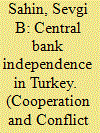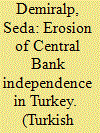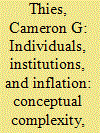| Srl | Item |
| 1 |
ID:
112414


|
|
|
|
|
| Publication |
2012.
|
| Summary/Abstract |
The Turkish state has been going through a neo-liberal transformation resulting from the strategic reorientation of state institutions in ways that enhance and facilitate the strategies pursued by market-oriented social forces. The reform that granted legal independence to the Turkish Central Bank (TCMB) in 2001 was an institutional turning point within the state structure in Turkey; this policy shift prohibited TCMB's granting of credits to the Treasury and other public institutions. Institutionalization of an anti-inflationary approach to macro-economic policy altered the power balance not only between different state agencies, but also between social groups in favour of financial interests that benefited from monetary stabilization. Rooted in a neo-Gramscian framework, this article explores the legal independence of the TCMB as a function of the market-oriented domestic social forces that emerged as a result of the process of neo-liberal globalization initiated in the 1980s. The article also emphasizes how the hegemonic unification of diverse identities and interests around the strategy of achieving price stability was crucial in the autonomy of the TCMB.
|
|
|
|
|
|
|
|
|
|
|
|
|
|
|
|
| 2 |
ID:
186863


|
|
|
|
|
| Summary/Abstract |
The ability to finance conflict likely affects the odds of sustaining a war and succeeding in it. Recent literature explores rebel group funding, but far less is known about how states finance their own war efforts. This article posits that the design of central banks should affect civil war termination. In particular, it argues that central bank independence affects civil war termination through two channels. First, financial markets consider central bank independence as a good signal in terms of macroeconomic stability and debt repayment. In this way, independent central banks enhance the ability of the government to access credit to finance and end a civil war. Second, central bank independence is associated with lower inflation. Inflation control reduces one source of additional grievances that the civil war may impose on citizens. On a sample of civil wars between 1975 and 2009, central bank independence is associated with a substantial increase in the likelihood of war termination. When the form of termination is disaggregated, (higher) central bank independence is associated with a higher probability of government victory, relative to continued conflict and to other outcomes. Additional tests provide support for the argued mechanisms: during civil wars, countries with more independent central banks access international credit markets in better conditions – i.e. they pay lower interest rates, and receive longer grace and maturity periods on new debt. Furthermore, in countries experiencing civil wars, central bank independence is associated with lower inflation.
|
|
|
|
|
|
|
|
|
|
|
|
|
|
|
|
| 3 |
ID:
169032


|
|
|
|
|
| Summary/Abstract |
This study provides empirical analysis to show increasing pressures over the Central Bank of Turkey (CBT) throughout the past decade where the CBT gives into such pressures, despite the Central Bank Law, which ensures tool independence. The study suggests that the relations between the government and the CBT reflect recent political changes where the government increased its control over state institutions, following rising costs of losing office. However, this trend not only has economic costs such as a restricted capacity to achieve price stability and sustainable growth but it also limits horizontal accountability of state institutions.
|
|
|
|
|
|
|
|
|
|
|
|
|
|
|
|
| 4 |
ID:
053513


|
|
|
| 5 |
ID:
139788


|
|
|
|
|
| Summary/Abstract |
Despite mixed empirical evidence, in the past two decades central bank independence (CBI) has been on the rise under the assumption that it ensures price stability. Using an encompassing theoretical approach and new yearly data for de jure CBI (seventy-eight countries, 1973–2008), we reexamine this relationship, distinguishing the role of printing less money (discipline) from the public's beliefs about the central bank's likely actions (credibility). Democracies differ from dictatorships in the likelihood of political interference and changes to the law because of the presence of political opposition and the freedom to expose government actions. CBI in democracies should be directly reflected in lower money supply growth. Besides being more disciplinarian, it also ensures a more robust money demand by reducing inflation expectations and, therefore, inflation. Empirical results are robust and support a discipline effect conditioned by political institutions, as well as a credibility effect.
|
|
|
|
|
|
|
|
|
|
|
|
|
|
|
|